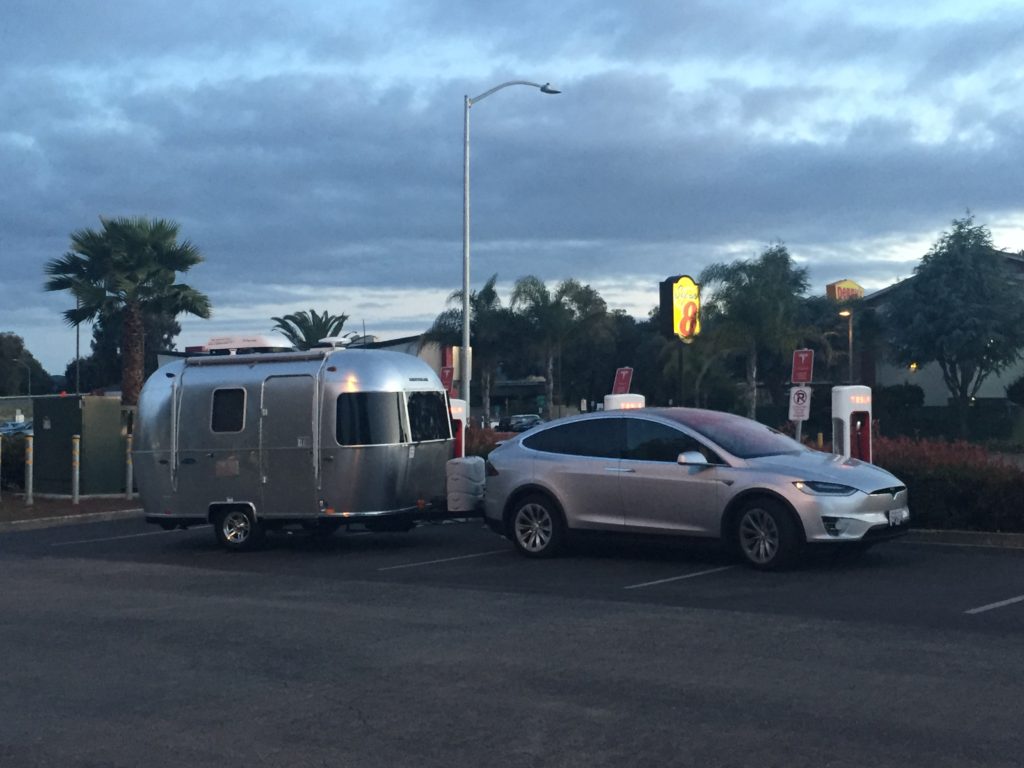Last Update: August 2, 2019
What is embedded in this question is the idea that electric cars have to be weaker than gasoline cars. That it's only gasoline, or diesel, that can supply the raw force required to do heavy lifting. The idea is false, of course.
Consider that phrase "100% torque at 0 RPM". Successful towing requires high torque, and that phrase promises electric vehicles will deliver on torque.

Ignoring the extreme violation of charging station etiquette we have here an example of a Tesla Model X indeed towing a trailer. This was in June 2016 in Gilroy, CA, at the Supercharger station there. I had seen this car at the Supercharger station when driving south that morning, and then caught this picture in the evening when driving back north. Presumably the driver was doing some range testing with a trailer.
I have seen or heard of other instances:
- A Tesla Model S had been driven from Seattle to Laguna Seca Raceway, and then back again, while towing a Nissan Leaf on a trailer
- A Nissan Leaf owner reports hauling 1200 lbs of scrap iron to a recycling yard
- A Mitsubishi iMiev owner reports hauling a trailer full of electric garden tractors
- The same man owns a Ford Ranger EV, and uses it to haul a camping trailer
- In December 2017 it was
reported that a Tesla Model X was drag-racing a Alfa Romeo, while towing another Alfa Romeo, and the Model X won
There is even a Facebook group,
Electric Cars that tow trailers with reports of from electric car owners towing things with trailers.
There are lots of other examples, and the point is that electric cars already are towing things.
Of course whether a given electric car should tow a trailer depends on the manufacturer recommendation. Was the vehicle frame designed to support hauling a trailer? Depends. If so, how much weight is safe for hauling a trailer? Depends.
You'd ask the exact same questions whether the vehicle is driven with a gasoline/diesel or an electric motor. Not all of vehicles are designed to haul trailers, and among the ones which are they might not be rated to haul a heavy trailer.
Electric trains and other heavy duty electric vehicles
It's not just electric cars that can haul heavy cargo. Let's take two examples - an electric delivery truck, and an electric subway train.


Electric trucks have been built all the way to class 8 semi's. That's some serious cargo hauling capability, way beyond the diddly little trailers we use with our cars. The example here was used for inner-city delivery routes.
Such trucks are hardly a new thing. Electric trucks were widely used in the 1920's and earlier.
Many train systems around the world have relied on electric trains for decades. This example is a BART Train, from the wide area commuter train service in the San Francisco Bay Area. A train like this surely weighs a couple hundred tonnes, and is fully electric. Similar trains are in use in hundreds of cities around the world.
Followup: Will an electric car need to recharge more often when towing cargo?
Yes, of course. Just like the gasoline/diesel vehicle needs to refuel more often.
This is physics - the amount of energy required is greater as the weight goes up. The trailer will also degrade aerodynamics, causing more energy consumption as well. Therefore the on-board energy will be consumed faster, and therefore the car will need to refuel or recharge more often.


